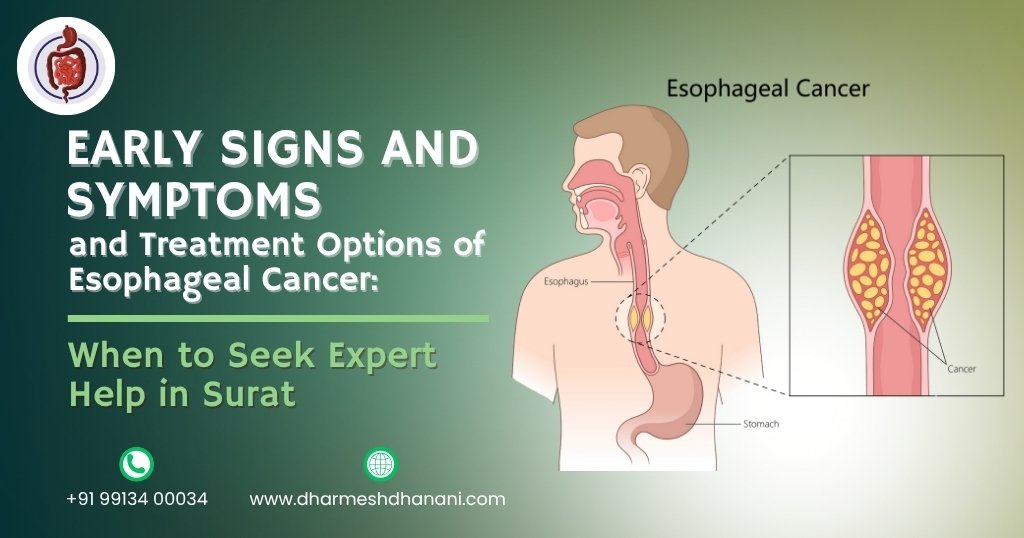
- +91-8808808186
- 11:00 AM - 01:00 PM | 04:00 PM - 06:00 PM
Best Robotic, Laparoscopic, Bariatric, Gastrosurgeon of Surat

Dr Dharmesh Dhanani
MS, FNB (Minimal Access Surgery), FACS, FALS, FMAS, FAIS
Consultant Gastrosurgeon, Bariatric & Laparoscopic Surgeon
Esophageal cancer, a serious condition affecting the food pipe (esophagus), is often diagnosed late due to subtle early symptoms. Early detection is crucial to improve survival and treatment success. In Surat, patients can access world-class care with Dr. Dharmesh Dhanani, a highly experienced Gastrointestinal Cancer Surgeon and Senior Consultant at Kiran Hospital.
What is Esophageal Cancer?
Esophageal cancer begins in the inner lining of the esophagus and can progress rapidly if not detected early. It is most commonly found in two forms:
- Adenocarcinoma: Often linked with GERD and obesity.
- Squamous cell carcinoma: More related to tobacco and alcohol use.
Early Signs and Symptoms of Esophageal Cancer
Recognizing these early signs could save your life:
- Difficulty swallowing (Dysphagia) – the most common early symptom.
- Unintentional weight loss – due to trouble eating.
- Chest discomfort or pain – especially while swallowing.
- Chronic cough or hoarseness
- Heartburn or acid reflux
- Vomiting blood or blood in stools
When to Seek Expert Help?
If symptoms persist for more than a few weeks or worsen over time, you should immediately consult a Gastrointestinal Cancer Specialist in Surat.
Dr. Dharmesh Dhanani specializes in early detection and advanced surgical treatment of esophageal and other digestive system cancers. He ensures patients receive personalized care tailored to their cancer stage and overall health.
Diagnosis of Esophageal Cancer
To confirm the presence and stage of esophageal cancer, the following tests are typically used:
- Endoscopy with biopsy
- CT scan or PET scan
- Barium swallow test
- Endoscopic ultrasound
Early diagnosis improves treatment outcomes significantly.
Treatment Options for Esophageal Cancer
Kiran Hospital, Surat offers a wide range of modern, minimally invasive and effective treatment options:
- Surgery
- Esophagectomy: Removal of the affected part of the esophagus.
- Minimally Invasive Laparoscopic Surgery – Faster recovery and fewer complications.
- Radiation Therapy
- Often used before or after surgery to shrink the tumor or eliminate remaining cancer cells.
- Chemotherapy
- Used in combination with surgery or radiation for better results.
- Targeted Therapy and Immunotherapy
Take the First Step Toward Recovery
Early diagnosis and the right treatment can make all the difference. If you notice any troubling symptoms, don’t wait. Book an Appointment with Dr. Dharmesh Dhanani – Surat’s trusted name in gastrointestinal cancer care.


